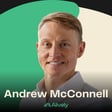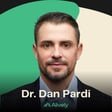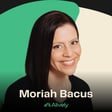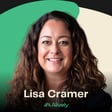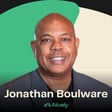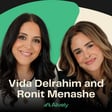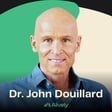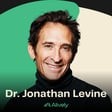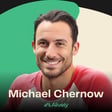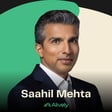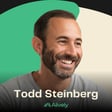The Challenge of Modern Food Environments
00:00:00
Speaker
At the moment we're working against a food environment that doesn't support our health. So we have to be smarter than the environment that's been built around us. It's not because we don't want to be healthy or it's not because we don't have motivation. We're swimming upstream at the moment. We're surrounded by foods and advertising for foods that are not good for us. So we have to arm ourselves with the right foods and make our food environment as good as it can be because we have control about that.
Introduction to Health and Wellness Podcast
00:00:29
Speaker
This is the Home of Health spam podcast, where we profile health and wellness role models, sharing their stories and the tools, practices and routines they use to live a lively life.
Meet Dr. Amati
00:00:44
Speaker
Dr. Amati, it is a pleasure to have you on this cold wintery day. Thank you for joining. Thanks for inviting me, Andre. It's a pleasure to be here. Yeah, you before we jumped in, we were just talking about the weather turning. And I thought it was kind of funny we were at the TEDx longevity in Boston where the weather really turned that day. it may You may have left right before. I think you did because it was sunny and gorgeous. And then all of a sudden it rained and all the clouds came in and like the next day it dropped 20 or 30 degrees Fahrenheit. Oh my gosh, I really, yeah, I must've been there just for the sweet spot then. because it was It was delightful. It was lovely when I was there.
00:01:22
Speaker
Yeah. So before we jump in to kind of why you were at TEDxL Injavity and what you do, would you mind sharing with the audience how you define yourself? Sure. So I'm a lively medical scientist, author, registered nutritionist, mom, daughter, and hopefully a good wife. Um, and I'm also an educator, so I spend a lot of my time thinking about how I can improve nutrition and health education for everyone.
00:01:49
Speaker
Thank you. Yeah, that that is certainly a lot. And I think in that first and last um kind of combined is how I got to know you at the TEDx longevity event as a medical scientist who's educating through that platform. Maybe if we could
Dr. Amati's Journey in Nutrition
00:02:05
Speaker
start there. So especially around nutrition, what do you do and what got you interested in this and pursuing a career and a life in this in the first place?
00:02:15
Speaker
Yeah, so I started off doing biomedical sciences and pharmacology and took the public health route. So public health, I think is better known now, but at the time it was a fairly niche thing. um I was very interested in the idea of population medicine. So how can we improve health at scale? What is it that we can do to really prevent people from being sick or getting sick and and then intervene in all populations to improve health overall. And that that took me quite quickly to the power of nutrition. So nutrition science wasn't instantly available to me because there's not that many universities that actually is changing now. But at the time, it wasn't like a course that was easy to find to to take. And ah the imperial Imperial College has been my university, my alma mater for a very long time, and they didn't have any standalone nutrition education. So
00:03:14
Speaker
I decided to pursue medical science and then apply that lens to nutrition research. So whilst I was doing my PhD, I actually started doing my own nutrition ah research and educating myself in nutrition from other sources. And eventually I did a master's in nutrition as well.
00:03:32
Speaker
so that I could make sure I understood the tools available for nutrition science specifically and so that I knew I'd done sort of the due diligence to be able to advise others on their nutrition because it is honest is honestly the most powerful tool we have. So I think it's super important to be very responsible with the advice that we give and for the public to know where to find that advice from somebody who is evidence-based and who has a scientific approach to what they're doing.
Food as Medicine: Historical and Modern Views
00:04:01
Speaker
On that point, right the the most powerful tool we have, I think it was Socrates saying, like let food be like medicine. I mean, it goes back thousands of years. And then even, I don't know if it was Edison or somebody much more recently said, hey, in the future, we're not going to have doctors treating disease, but it's going to be how you fuel your body, and the things that you put in. And so these are things that it seems like are intuitively human and know, right? We didn't need microscopes to know that this is an important thing. And yet, as I understand it, my parents were both physicians. There was no nutritional education. I mean, my dad, when he started learning about it, lost 65 pounds, started running half marathons and said, I had to unlearn everything they taught me in med school about nutrition. And then I've heard others say,
00:04:48
Speaker
hey, in my four years of med school recently, ah people have graduated in the past five years, I got a total of two hours on nutrition. And how do these things reconcile? if If we really do know how important it is, why is it so divorced from what we see as traditional medicine? Yeah, it's a really good question. I think we're seeing change now. So the US introduced a bill that meant that medical education has to include nutrition, but very recently. and In the UK, some universities have introduced nutrition education to
Evolving Medical Education: Prevention vs. Intervention
00:05:22
Speaker
medical schools. It's not compulsory. so in Imperial College, I teach the medical students there. They only get a few hours with me, but we're hoping to increase that.
00:05:30
Speaker
I think the answer, though, is that the medical system and medical education has been set up to help treat people who have something to fix. So um traditionally, it was you know someone presents to a physician, and they have a broken bone, or something has gone wrong with one of their organs, or they are delivering a baby. So something needs to happen. There is like a ah clear path to an endpoint. And I think that's where and you know, public health has changed a lot. So we did used to die from infections and sort of, well, infections, mostly actually. and in infectioniousios yeah um And so it made, I guess, at the time, it made sense to have doctors who could
00:06:16
Speaker
see a patient and try and prevent gangrene from happening or try and prevent sepsis from happening in some way, um even if that meant just chopping the limb off. I mean, it's quite brutal, right? um And now the epidemiological shift we've seen in the past, gosh, I mean, 100 years or so now, but we've really seen this epidemiological shift where the majority of the population across the world, so not just high income countries, but also middle and low income countries, everyone's dying from chronic disease.
00:06:46
Speaker
So we've done a good job of increasing hygiene. We wash our hands more, which is actually where it all started, right? So we people used to die because doctors just didn't know to wash their hands between surgeries, for example. So that that helped. Vaccinations, antibiotics really helped to reduce it ah death from infectious disease and from infections. And so now we're left with this population that's not just dying off um as much from these diseases.
00:07:15
Speaker
But they're living longer and not living very well. And this is where chronic disease plays a part. Now, chronic disease now has it's emerged. like It's emerging. It's been a while. You're right. It should have changed by now. But it's clear that diet-related chronic diseases are the leading causes of disability and early death. So now with this real restructuring of how can we help medics and medicine to not only be this amazing resource of life-saving intervention when and there is a big trauma or there is a sudden infection, but also how can we actually help them to to prevent disease? But the system isn't set up for it yet. And I think it's such a monumental change that
00:08:02
Speaker
we haven't been able to to implement it. And the thing is, is that at the end of the day, medics will still need to learn the same amount of information to make sure they can do the thing. ah But then they also need to learn more about prevention, which is a different thing. So interestingly, some people think that medicine should be split into two specialties so that there should be doctors who are specialists in prevention.
00:08:26
Speaker
and then doctors who are intervention medics. So they're the ones that work, you know, work A&E, work trauma. And so you have the same basic education, but then what you specialize in in terms of output is either related to preventing chronic disease or to treating end-stage cancers,
Lifestyle Medicine and Specialized Training
00:08:44
Speaker
infections, and these sorts of things.
00:08:45
Speaker
That's quite an interesting way to think about it, but more and more you do see that a lot of healthcare professionals, including doctors, are really keen to help more with preventive preventative care. and I think lifestyle medicine is having a big impact on that. so The ability to to do further training in lifestyle medicine as a doctor is helping that.
00:09:07
Speaker
so Yeah, that was a very long answer to your question, wasn't it? yeah Yeah, it was a good one. I hadn't heard about that splitting the two. it It resonates with me and my father made the point of when I went to med school, it was four years. We now know infinitely more and it's still four years. And if we needed all four years to learn what we were supposed to know back then, how could it be the same amount of time now when there's so much more we need to know?
00:09:34
Speaker
And yeah there's a story about when they were redesigning the the cockpits for fighter jets in the US s kind of after World War II. And they said, hey, you know the American population has changed in size and height and everything. So maybe we need to redesign these cockpits.
00:09:51
Speaker
and they went to look to do it and and redid it all around the average pilot, average height, weight, length of arm. And so they' they're like, okay, here's what the design should be. But before we go build all these planes, let's see how many people are actually the average that this fits. And the answer is zero.
00:10:08
Speaker
um man Because it was the average like nobody was average on every single metric. They had zero pilots that actually did this. And so the lesson was to make it flexible yeah instead. And so a system instead of saying, hey, we have to get one person that we teach all these things to, maybe we do this flexibility of, hey, we'll have somebody that's like your functional, out the front end, how do we just keep you living with vitality, at the back end of, hey, when things do go awry, we address it. It's very interesting.
00:10:36
Speaker
Yeah, I love that story because but statistically, really out of 100 people, only one person should sit on the 50%. So it makes total sense, right? But yeah,
Future of Personalized Medicine and Nutrition
00:10:47
Speaker
and it's the same. I think with medicine, so what's a really clear theme is that personalization is the future of how we can actually be effective at prevention.
00:10:57
Speaker
Because whilst it's good to have for certain preventative measure measures for everyone, the true key to understanding risk and where to focus is understanding personal need and and individualized care. So that's where I think it's exciting to think about what's going to happen in the near future, is that we're going to see much more personalized medicine, personalized nutrition, personalized exercise. like Because it doesn't make sense to give everyone the same advice.
00:11:26
Speaker
yeah and Even when we think about, you know, the do 150 minutes of and moderate exercise, like what does that mean? And what does that mean for someone who's in their 30s and already aesthetically very able or someone who's 65 and actually really trying to begin their fitness journey? So I think that's where in terms for like to improve all the outcomes, personalization is key. and Being flexible with how we measure success as well is really important. and I think that but like we also need to stop relying on the medical system to provide all of the answers. so you know We talked earlier about the fact that it's not new news that food is important. We've we've known the power of food arguably for like the longest time because
00:12:10
Speaker
our entire lives used to revolve around foraging, hunting, gathering food, going back to our like to our society, then preparing and sharing the food, and then telling stories and drawing cave paintings about that food. so like Literally.
00:12:26
Speaker
It needs to be our entire lives. And now I think what's happened is we've moved so far away from from the power of food that we're having to relearn it. So I don't i don't see the modern science and nutrition science in the advancements. I don't see them as at odds with established wisdom. So there's food wisdom is incredibly important. And what modern nutrition science is doing is actually understanding the mechanisms to the food wisdom. It's like, okay, why is it that eating or a variety of vibrant, you know fragrant herbs and spices and plants, like why is that good for us? what are the actual So we know it is, we've always known it is, and it's been part of our diets forever and ever across the world in different ways. But now we have the science to see
00:13:16
Speaker
how these polyphenols are impacting the gut microbiome and how the gut microbiome is creating these amazing post-biotic chemicals that are then influencing several health markers across the body through the blood. so like It's amazing what we can understand now is that the mechanisms of the why that feed wisdom is true. Is there a danger in
00:13:39
Speaker
only understanding at a superficial level. I think back to, for example, with vitamins, like, hey, vitamins are important. So let's just create pills to take it without realizing, hey, the vitamins are important because of how they're digested and part of this other thing and how they tie it, and you can't just pull out the individual.
Complexities of Nutrition Science
00:13:55
Speaker
And so as we see the mechanism, we're seeing one piece, it's like the the blind man of one's grabbing the tail of the elephant, the other the trunk, the other ah The lag and they describe different animals that we're only seeing one part of the picture and we can start taking some of the wrong lessons and yeah, and here's a pill that we can sell yeah versus no, just eat these things that we've known for thousands of years to eat this way.
00:14:20
Speaker
and this is i guess where like but This is where nutrition science has evolved beyond that. so I completely agree with you. There's a whole phase of nutrition science which was exactly vitamins, ha, amino acids, ha, individual components.
00:14:34
Speaker
and you know the supplements industry, frankly, has like continued with that thread because it works very well for them. But actually, nutrition science now is much more about complexity and it's about the synergistic effects of foods and what happens when we look at the entire system effect. So, what happens across your glucose response, your microbiome response, your blood fat response, what happens with your satiety signaling, what hormonal feedback is there? So I think the science has moved on from that. It's much more about complex pictures and interactions, but there is a risk of this yeah individual Lego brick approach where you know actually we don't see the complexity and and actually when we think about
00:15:22
Speaker
things like food additives, that's where the science has gone wrong there too. So, you know, we test food at individual food additives for toxicity and sure, but like we don't eat one food additives at a time. If you're eating a food that has food additives, it's probably 12. And so actually what's the cocktail effect? So we need to look at, we need to start taking a much more wide lensed approach. And I think scientists have started to do this, but unfortunately,
00:15:50
Speaker
humans quite like simple answers. And so the dog the more the more simplistic approach of, well, if you have a cold and you take vitamin C, it'll help, is simpler than saying, actually, what you need to have is a variety of fruits and vegetables that contain a variety of polyphenols, not just vitamins, that will help to support immune system function. But actually, you need to do this 360 every day of the year.
00:16:17
Speaker
because the immune system isn't like a two-day hobby, it's an everyday thing. so it's um it's I think partly there is a ah feeling that a lot of people would like to know what the quick fix is, but we've also been so missold and misrepresented this idea that there are quick fixes. There really aren't. like Unfortunately,
00:16:39
Speaker
or for or Fortunately, I don't know, but it's for sure that even where supplementation is medically recommended, which is actually quite rare, but say for example, someone has quite severe anemia, and so supplementing with iron is a really good idea, right? Let's get that back on track. It's not a long-term solution.
00:16:59
Speaker
we have to find out why the iron is low and then treat that at the court at the root and really then be able to make sure this person can continue to have good iron levels through their diet and lifestyle because you can't just keep supplementing iron. It has terrible side effects for starters. It's very not well tolerated and it also means that there's still something not right and that we haven't fixed. We've just kind of topped up the level and have an address. theite You have to go up the river at some time. Who's throwing the bodies at? Let's go up and see what's going on up there.
Supplements vs. Whole Foods
00:17:29
Speaker
I think we're going to see a change in the way that artificial micronutrient supplementation happens because there's been we're flooded, the market is flooded with artificial micronutrient supplements that are not regulated and that have zero science attached to them. Because the industry isn't regulated, there is no requirement on anyone making a supplement to actually test it to see if it does the thing it's supposed to do.
00:17:54
Speaker
And actually, it's a bit more sinister than that. There's even no regulation to check whether what you're selling contains what you're selling. Right. And it like doesn't also contain a bunch of other stuff that you're not supposed to sell. That you're not buying, but you didn't sign up for. and so and then we And I think when people realize this, and sometimes it's quite sometimess hard because you're taking away a safety net.
00:18:19
Speaker
So you know people are saying, I'm taking this, and I thought it was good for me. And then it's like, well, actually, we don't even know if it's the thing has a thing in it. like and And even if it did, the evidence that we have for supplements across the board is that they do a fraction of what dietary change does, if if at all, if at all. So the running the longest-running trial for vitamin D and omega-3, the vital trial, it's been running for, I think, close to 10 years now. Very well well-run randomized control trial.
00:18:47
Speaker
There's no real benefit to taking omega-3 supplements every day. at all. and People have been making these food. They're not cheap, right? like it's not They're typically not one of the cheaper ones, either. They're not cheap. and Then there's a lot of noise out there about you have to buy the really pure ones from this place and it costs 10 times more. When you look at the data, is okay so what are you taking it for? If you're taking it in the hope that it's going to prevent something, well, the data is pretty clear that it doesn't do that.
00:19:18
Speaker
and it's It's the same with vitamin D. Just taking vitamin D by itself isn't doing things. um so We have to be really mindful and aware of what we're doing these things for. and Oftentimes, people are taking micronutrient supplementation to provide them with a sense of security about their dietary quality and their nutrient intake. And that's why it's dangerous actually, because that it is a false sense of security. yeah It is not doing the thing that you're hoping it will do. And so my biggest concern is that people are spending quite a lot of money, which could be spent on buying fresh produce or you know really good frozen foods or processed like tinned foods that are really good for us.
00:20:01
Speaker
and we'll come to like process versus ultra-processed soon. and Instead, they're buying these supplements, and really, there is no evidence of support that that will do anything, but it gives people a false sense of security. and That's what I worry about with with supplements especially. I think people are just starting to wake up to this a little bit. and Certainly, we see with our members, people who do ZOE and they start they change their diet and they start to implement dietary change, they so they stop taking their multivitamin.
00:20:30
Speaker
Yeah, because that that was what I was going to say of false sense of security and or an excuse not to do the base level right thing of like, Hey, I'm going to do this easy pill and then do all the bad stuff over here. And you're not really getting the benefit. You're getting the detriment on one side and maybe no benefit on the other. And and you're like double whammy.
00:20:49
Speaker
My question to you being this, this is your field, right? This is what you study. This is what you teach with Zoe. You're trying to have an impact on more people to have this. What does that do in terms of informing your own diet and and how you look at nutrition on a day to day, week to week, month to month basis? As in for myself. Yes. Yeah. Just um what you do. Yeah. Yeah. So I think, you know, I'm continuously learning, but I think I,
00:21:19
Speaker
i've been I did to quite a lot of research on the Mediterranean diet earlier in my career, and it was it's very obvious to me, and ah it's hard to argue with it, to be honest, that the Mediterranean diet is the most well-researched diet, and it has the most compelling results. So like if you look across any health outcome that it's been tested against, it has a positive net effect.
00:21:42
Speaker
And ah in this in the rare studies where it's like, there was a positive effect, but it wasn't significant. There was never a negative. So it's one of those ones where like that it just, why not? Like seriously give it a good go because it has very, very, very high likelihood that it's going to improve things. so The Mediterranean dietary pattern for me has always been the the template that I use for myself, use for the food I bring into my household as well.
00:22:12
Speaker
and it's it's what i used to formulate advice for others as well. But of course, there are elements of personalization within that. Before we move off of that, just I know we kind of assume everybody knows what that is, but yeah and i do you mind just double clicking on, when I say Mediterranean diet, here's what I
Exploring the Mediterranean Diet
00:22:32
Speaker
Yeah, so what I don't mean is eating pizza and pasta every day. What I do mean is that so the Mediterranean diet is really characterized by a whole plant food diet. So it's a lot of plants. And when I say a lot of plants, I mean, half of your plate is enough.
00:22:49
Speaker
No, no, no. Yeah, so whole foods. So this is not your plant-based chicken nuggets, not that. um And it's it's really leafy greens, seasonal vegetables, so that may be aubergines, carrots, zucchini. It depends on what you like, artichokes, olives, all the wonderful, so many plants to choose from, mushrooms. So it's all of these plants, then there are some crucial foods that most of us don't eat. um And those are whole grains. So with here we're talking about buckwheat, and spelt, and barley, farro, I think it's the name for spelt in the US. And quinoa, and so these real, these freaky, they're whole grains. You can also get steel cut oats. So oats is an old grain, but we tend to process that into a fine powder, which doesn't really help us. um So there's all these wonderful whole grains.
00:23:44
Speaker
and that we have stopped eating in our diet and they are very helpful for us and then legumes so here we're talking about garbanzo beans and beans and lentils we're talking about green peas the humble green pea these are all legumes and again most of us might might you know you might say oh yeah i did eat I ate like a bean, or maybe I had like a burrito three days ago or something, but it's like not regular and not regular. So these are things that we should be eating every day. So every day, whole grains, pulses, a variety of vegetables, including green leafy veg.
00:24:20
Speaker
And then the other one that's really dropped off the radar, and this is very likely due to diet culture, which scared us, ah is nuts and seeds. Nuts and seeds are amazing. They are powerhouses of nutrition. And a lot of us stopped eating nuts that they were vilified as being like high calorie and therefore you shouldn't eat them and they're high fat and all this stuff. And like, oh my God, that's so good for us.
00:24:42
Speaker
So with some of my patients, I still struggle. but I say to them, like please eat nuts every day. And they go, OK, but how many? And I'm like, no, no, no. Just have a handful. You'll be fine. Just three, half walnuts. I'm like, don't be scared of the nuts. Just eat the nuts. Is it a legacy but because of blood pressure that it was so roasted and salted that it wasn't the nut that was as much the issue as what we did and how we're consuming?
00:25:06
Speaker
I think it was a legacy of like just the fact that the high they're high energy denser. They technically have a lot of calories in them from the fats. Now, they're all healthy fat profiles, which we need more of in our lives. but um And also, crucially with nuts, they're incredibly hard to digest. So as you'll know, they're crunchy when you bite them.
00:25:26
Speaker
and so to For our bodies to actually break the food matrix down of nuts and access all of the energy in the cells is a lot of work. we don't very We're not very efficient at it. so When you eat almonds, you might extract only 30% of the energy from them because you just can't break the walls down. of so so okay so There's nuts and seeds as well. and The other real staple in the Mediterranean diet is extra virgin olive oil. Extra virgin olive oil has its own place like you're on a pedestal, to be honest, in the Mediterranean diet, in that it has a beneficial effect. And the more you have, the more you have. like there is you know It's not one of those things where you're like, oh, yeah, you need three tablespoons, and then there doesn't get much better than that. No. So the PREDIMED trial showed us that if you add more extra virgin olive oil to the Mediterranean diet, which is already high in extra virgin olive oil, you get even better outcomes. So it's like,
00:26:19
Speaker
and I know it's expensive at the moment. and the There's like a global supply issue. It is expensive, but I think the way I frame it is that we don't think twice about spending $24 on a bottle of wine to bring to a dinner party.
00:26:35
Speaker
But if a bottle of but of olive oil is $21, we're like, you're going to get a hell of a lot more of life out of the extra virgin olive oil bottle than you are of the of the wine. So <unk>s I think we need to reframe it. Hopefully, the prices will, of course, change with um when next year's harvest. but it's it's It's a real investment in health to be having olive oil in the diet. So those elements are the core of the Mediterranean diet, but it's not a vegan diet. It it doesn't have animal products in it. Now, the ones that stand out are fermented milk products, so natural yogurt, cafe, and traditional cheese. So what does traditional cheese mean? It means, like,
00:27:15
Speaker
that it was actually fermented into a cheese instead of being you know you're like like your cheese slices or cheese strings. None of that. Not those guys. So they have a real place in the diet and an oily fish as well. So oily fish That could be salmon, mackerel, trout. um that you know I actually like going for the smaller. So I'm a fan of sardines. I'm a fan of eating anchovies. So there's lots of, and actually shellfish contain omega-3 fatty acids as well. so And they're very much more sustainable. So whether it's mussels or clams, I love clams. Those are all really good sources. And then eggs have a part to play.
00:27:56
Speaker
But you can now, now we move into a little bit of meat. Now, white meat is preferred. So we're thinking chicken or turkey, and then occasionally red meat. And when I say occasionally, sort of once a week, and a normal size portion on a plate that also has all the other vegetables we just spoke about. So so not a 20-ounce ribeye three or four times a week. No, not a 20-ounce ribeye with a side of fries and like one boiled broccoli.
00:28:24
Speaker
doesn't i and And then and and the the sort of red meat is give or take. There's no special reason to necessarily include it if you don't want to.
Optimal Beverage Choices for Health
00:28:34
Speaker
And then the the other thing that's really interesting is the drink of choice is water. Water, herbal teas and coffee.
00:28:45
Speaker
So no energy drinks, no sulphurs, no sodas. And this sounds really obvious, but sometimes just telling people, look, just make water your main drink can have the most phenomenal impact on their diet. Because we are surrounded with a variety of different drinks that are not water. And they might even be I've seen protein water, which I was blown away by. all really i like There's protein water. There is like added mineral.
00:29:20
Speaker
there's out theres You can go into a right, and then just but just drink water. Just water. and And make that your main drink. If you like herbal teas, wonderful. um If you love coffee and it you tolerate the caffeine, amazing. It's very good for your health. in order If you don't tolerate the caffeine, because i like olive oil, I had seen, hey, there's two cups are better than one, three cups are better than two, four cups are better than three. And then Matthew Walker made the point of,
00:29:48
Speaker
I'm not sure it's the caffeine in there helping, right? It's all these antioxidants. So we can get a good decaf. And so I've just gone decaf Americanos, espressos. to try to get the benefits of the coffee without loading too much caffeine in there. Right. So it's absolutely true. So with coffee, we've just published a paper on this last week, actually. So coffee itself, the benefits come from the polyphenols, and it actually has fiber in it. So for some Americans who drink a lot of coffee, it might be quite an important source of fiber, because it's about, you know, about a gram of and a half of fiber per cup.
00:30:23
Speaker
So we're looking at the compounds that are in the coffee are actually having the beneficial impact on the gut microbiome. But caffeine itself, of course, does have an impact on cognitive function and athletic performance. So it depends what you're drinking your coffee for. i need I like caffeine for me in the morning. It helps me to function better. But if you don't tolerate caffeine, and caffeine tolerance is genetic. So it's down to whether you code enough and of of an enzyme that helps to break the caffeine down.
00:30:51
Speaker
If you're somebody who doesn't code a lot of it, then you'll have a cup and you'll feel a bit uncomfortable to be honest, like a little bit too much. And it can, the half-life, so how long the caffeine stays in your body is really long. So you couldn't possibly ever drink a coffee, a caffeinated coffee in the afternoon and then go to bed. So if you're one of those people, then you really don't need to drink caffeinated coffee and you can get all the buy-in benefits from decaf.
00:31:19
Speaker
And so a lot of people do that. And then there's people like me who have like 15 copies jackie of the gene. And I have so much enzyme in my my body that I can drink coffee and go straight to bed. So it depends. and it I always encourage people to just...
00:31:34
Speaker
See how they feel. this Listen to your body. It will tell you if it likes coffee or not. And if you really don't like the taste and everything, don't force yourself to drink it because, you know, like a a green tea and other foods can have a beneficial impact. You don't have to force yourself to drink coffee. Everything we've just talked about is grocery store driven. Right. Like you you kind of outside of the the market, the buying the plants every now and then getting the meat.
00:32:03
Speaker
Is there a place in your own life for supplementation? Like we're we're talking in the winter in the UK, the degree of sunlight due in winter, you supplement the vitamin D or there are other things you say, Hey, depending on time of year or things I'm doing, here's supplements that I use. Like for example, the 30 plus from Zoe yeah that maybe people are trying to get into their diet. if Maybe we could talk about that as well. Yeah, sure. so I think what's important to realise is like what I do is what I do, but public health recommendation is to take vitamin D supplements in the winter months in the UK because we don't get sun anyway, any time of year. This year we have had no sun. So just to make sure that no one falls below physiological
00:32:49
Speaker
sort of health levels, essentially. It's a good idea to just test supplement, but I would stress with vitamin D, and I did a very deep dive on this with Professor Tim Spector on the Zoe Science and Nutrition Podcast on vitamin D. You know, if you're not sure, six take it, but stick to the recommended dose.
Navigating Vitamin D and Supplement Use
00:33:08
Speaker
Do not do high-dose vitamin D. It won't be helpful, and it could be harmful. So that's one thing to note. I personally don't regularly supplement with vitamin D.
00:33:19
Speaker
But I do try to get back to Italy where I'm from ah every year and get sunshine. Now, vitamin D is a fat-soluble vitamin that loves to get stored away in your fat cells and then come out later. So if you can get vitamin D, if you can get sunlight exposure, and preferably throughout the year, then you'll you'll likely have some. But as I said, public health recommendations is to supplement.
00:33:46
Speaker
There is one thing that 95% of adults in the US are deficient in, and that's fiber. So 30 grams a day is the recommended a day amount. The majority of adults reach about 18 grams a day, which is the recommended amount for a four-year-old, in case you're wondering. And in a lot of ah populations that is actually way lower than that, it can be as low as 10 grams a day. So when we think about that,
00:34:15
Speaker
or the way I thought about this, um with my background in public health and wanting to do something that's useful for pretty much everybody, right? That is why we created Daily30. So Daily30 is Zoe's fiber supplement, but we've applied a lot of the science around, we've just spoken about the importance of whole foods. You're right, the Mediterranean diet doesn't have any space for artificial micronutrient supplementation and ultra-process feeds do not feature on the pyramid.
00:34:45
Speaker
What does feature is home-baked cakes. So home-baked goods do feature. But we don't have any of these sort of things that you see now, like protein bars and high-protein cookies and muffins. That doesn't like exist. No, there's so much of that, right? So what did we do? So we took the principles of public health nutrition that essentially dictate that The major drivers of diet-related disease are what's lacking from our diet. It's diet low in whole grains, diet low in fresh fruit, diet low in legumes, diet low in fiber. These are the things that are driving poor health. and We wanted to create a product that just helped to nudge that back.
00:35:29
Speaker
so daily thirty contains whole seeds, whole nuts, whole herbs and spices. We put in whole grains. We put in lentils. So we put something from each of the food groups. We put in mushrooms. And we've also put things in that are harder to find um to bring diversity. So bayobab. And we've also got just a really nice variety, to be honest. And the way that we designed it was because we know that what we're not eating is the problem. We don't want to replace food. We don't want this supplement to be taken.
00:36:01
Speaker
without food. So as you'll see, or it is, but it's available in the US literally as of today, it's essentially something you have to add to a dish. So you've got to add it to something. You can't just like shovel it in or you can't mix it in water because it's whole food. yeah um I got a sample oh great yes your call today and of course, uh,
00:36:26
Speaker
my My assumption is it goes in a glass watch, so I'm going for it in. And then she was like, no, no, no, no. This is a totally different approach to it. So then I went and got some chia pudding and put it in. And oh my god, it's delicious. We're putting it on top of the salad yeah if you go more of the sweet or the savory. So I've just started doing.
00:36:43
Speaker
each night i see me It's so funny that you automatically added it into a glass of water because that's what we're so used to doing. So no, it's literally designed to add to meals and actually it helps you, it's like there to encourage people to add it to their beans because they don't know how to, but how do I cook beans? Okay, add that on, it's going to taste great. How do I add, how do I like cook whole grains? I don't know how to make barley taste more. You put that on, it's it's it's savory, it's crunchy, it's delicious, right? I love it on scrambled eggs.
00:37:12
Speaker
Very good. and so So we've created that and honestly, it took us two and a half years to get it to a place where we were really happy. And we ran a randomized control trial because we're a science company and we wanted to see, okay, we've created this product in the hope that it would actually impact health outcomes. So we ran a randomized control trial and the results were really great, really, really pleased that it does what we planned it to do. But it you know it's so important to note that we're in the minority. People who produce products like this, and oftentimes I think people do produce these products with the hope that it will improve an outcome, but they don't test it.
00:37:55
Speaker
like Well, we think it's not a strategy. Yeah. So it's like, well, we you know, ah this is the narrative that happens a lot is, well, there's a study for this thing over here and there's a study for this thing over here and there's a study for this thing over here. So if I put all three of them in the same pill, all of this will happen. I'm like, that's not how it works. um So, yeah, we're really proud of the approach we took. And listen, we didn't have to do that. But I think for us to be able to stand behind the product and to be Proud of it, we did. So so that's what we've done. and And what's been really nice to see is actually the customer feedback. So people love the taste. They feel the difference. And it helps them to enjoy food more, which is so important. like Food is delicious. It's there to be enjoyed. so that that's been So it's been a really rewarding process to see how it's actually helped people to engage with improving improving their diets.
Mindset and Enjoyment in Nutrition
00:38:50
Speaker
And I'd love to reinforce that last point, because I think a lot of people hear healthy eating, healthy nutrition, and they think of all the things. Oh, I can't have my pop-top anymore. I can't have my fruit loops. And if you go instead of a mindset of depravity to one of abundance of Wait no i have this entire universe of things and maybe i don't like me but wow i love yellow squash work with this place i like it just finding the things that you like so that you're leaning into something versus running away from something that is gonna make it much more rewarding sustainable.
00:39:25
Speaker
Because in the end of the day, you're just going to feel better. Like once you start doing it, you're just going to feel better and you're going to want to lean into it. But find what you like and it's not pinch my nose to go take this medicine. So no, this is the whole universe of plants that you get to tap into. Enjoy it. Exactly. And it's it's positive nutrition. So this is exactly the approach we take in in the Zoe product. So when you have your your membership and you you you have your results in your app, what we're what we're doing is actually encouraging you to eat more foods, eat a diversity of foods. Like try and add this to your plate. And when you start adding these foods in, meals taste better.
00:40:04
Speaker
Your satiety improves. you i mean Energy, mood, reduced hunger and improved sleep, by the way, are like our our biggest success metrics with our members. It's amazing. so we've also We've also seen in our clinical trials like improvements on bio you know on the sort of data that we like to look at when we're scientists. Look at that lovely improvement in triglycerides.
00:40:24
Speaker
but actually It's about those improvements in the blood markers, but it's also about how people feel. They feel much better. And so where you might find yourself reaching yeah for the Fruit Loops like every day, you actually start to not reach for them every day. And it's not about never having them again, right? it's It's not about that, but it's like you've had all of this wonderful food and you've added all these new foods on, and there's still space for you to have whatever it is that you want to have. But that's that thing isn't what you're getting your nourishment from.
00:40:55
Speaker
this group of foods is where you're getting what you need to thrive. and then This is here because it's fun and maybe it's a child of memory. and you know's like I have to say, though, in my own experience, the longer I do this work, the less of those foods I enjoy. like i just cause You just get used to what you eat, if that makes sense. and It sounds obvious, but for me, like so sodas were never part of my life.
00:41:20
Speaker
ever. And they are non-existent in my life now. like the I would never choose. There's never a day where I'd go, oh, gosh, I could really have... you know a diet coke. It just doesn't happen. It's just not on my radar. and I'm not bragging, but it's just it's happened over time. When I was a student, when I was younger, like I would have one and I would enjoy it, but now it's like, I don't even want it. I think that that a lot of people do find that as they change their diet and they improve their dietary quality and they become much more aware of how food is making them feel, how they perform on this food,
00:41:56
Speaker
when you think about, oh, well, do I want to have this ex food? Actually, no, I don't feel great with it. And it doesn't, I don't want it. ah You just not, you don't want it. It's a simple as that. and And that so over time, your dietary quality overall improves. And it doesn't have to be a restriction. It's not in fact, it is the opposite of restriction. It's because you have this new abundance in your life.
00:42:20
Speaker
that you, you end up, it just, the other things drop off the side. Yeah. Crowds out. Yeah. You've referenced sleep a couple of times.
Optimizing Sleep and Setting Goals
00:42:28
Speaker
I mean, one, you were saying, Hey, I've noticed with caffeine, it doesn't really impact me. I can, I can process it too. One of the benefits we see as people start adding this is better sleep. What have you found for you personally positively impact your sleep? Like what is your sleep routine in terms of, Hey, here's the environment I create, et cetera, to optimize your sleep?
00:42:50
Speaker
Yeah, so I mean, Andrea have kids. So my sleep is widely dictated by them, but they're a bit older now, so they do sleep, which is a bonus.
00:43:00
Speaker
i I know for myself that the quality of my sleep is an overwhelming predictor of my performance. so And it's not just me, right? This is a lot of people. So what I approach sleep quite i take it was seriously. But it's not it's not a boring for me. like I love it. I love sleeping. And I really enjoy having a regular sleep schedule because it makes me feel really good. So I tend to um try to do like the obvious things and It doesn't work every time, but I try to avoid screen time like before I go to bed. Sometimes there's just a really good Netflix documentary on and and like I'm like, fine, I'll just drop my seat for three days. um But ah generally, I try not to. and I do the sort of all the things that will help me to wind down before I go to bed.
00:43:52
Speaker
And I like having got a cold room, but with a with a warm bed, if that makes sense. So like a good tog duvet, but in a cold room and dark blackouts. I actually wear um i like an eye mask, so complete blackout. ah And i'm I'm also really keen on very good quality pajamas. So it's interesting that regulating your body temperature at night really does imp impact your sleep. And so I'd opt for natural fabrics, whether it's linen or cotton, and it makes a big difference to your suit quality. And also like some simpler things, I guess, that actually are related to timing. So I don't eat late. So eating my dinner, no late is in seven.
00:44:37
Speaker
is is ideal for me to then be able to get a really good night's seat. The other thing which will come as no surprise to anyone who owns a Ora ring or a whip is not drinking alcohol in the evening. I very rarely drink alcohol anyway, but if I do,
00:44:53
Speaker
I prefer to have a glass of wine with friends at lunchtime because even one glass of wine at dinner just actually throws my sleep off, so it's not worth it. It's not worth it for lots of other reasons, but those two things like eating late and drinking in the evenings don't help at all.
00:45:12
Speaker
so Yeah, it's not actually that strict. I don't do, I'm not, there's some people who have amazing sleep routines with like really hot baths and then journaling and reading at least three pages. I don't know that's, I think maybe that could come later in my life when my kids are older. and ah um But for now, it's just knowing to like avoid screen time, having a really good temperature and knowing that I sleep better that works for me is like the darkness and the comfortable pyjamas in in natural fibers. And then I also try to make sure that I give myself enough time. So if I know I've got to wake up early than usual, go to bed earlier. For me, there is no shame in going to bed early if I have to. um So I think and think and that does maybe come with age. I don't feel so much social pressure to attend evening events if it doesn't fit with my schedule. i like if it's If I know it's going to make me feel worse, I won't do it.
00:46:07
Speaker
You've referenced journaling as something you don't do necessarily at night. yeah and evening But on the mindset side, now you just clarified that you don't do it in the evening. Do you have, similar to like nutrition, is a 365 day a year thing?
00:46:24
Speaker
our mindset and and maintaining that and establishing that is also not, you go to one Tony Robbins conference and you're set for life. How do you think about that and how do you incorporate it and into your day to day or week to week? Yeah, I mean, it's interesting. I have, I certainly have, I have like a toolkit of things that I can use, which helps me. and And I do, I go through phases where I use it more than others. So I think day to day,
00:46:50
Speaker
I have a very good narrative with myself. So you know you get to that point where I'm very good at self-motivating, but I'm also very good at de-escalating. So I try not to overstress about things or put too much weight on things that doesn't that don't need it. So that's something that I practice every day. And there isn't like a specific way of doing that. It's just something I've cultivated over time.
00:47:16
Speaker
um But there are a few things that I love and so there's a brand called Intelligent Change and they do some really cool cards that you can buy and they're just like little reminder quote cards but they're really nice. They're really nice but like the right level of they're inspiring and they're thoughtful but they're not too fluffy.
00:47:36
Speaker
if you know what I mean. so i like that and And they have a really good journal. They have actually several different types, um which are rapid. they're sort of It takes three to five minutes, and it's a really nice way to frame frame the day and frame what I'm doing. And there's actually one thing I'm very keen on and works really well for me, and that is creating a yearly vision board. And it's I started doing this, like I don't know, five years ago now. And um it really helps with...
00:48:06
Speaker
my clarity and my direction. And so it's something that each year I get super excited in December, I start getting the things together and start thinking and start planning about around like, what's you know what's the next year going to look like? What is it that I want to do? And that is surprisingly efficient. So I think and I have that in my office right that right next to me. So that's an anchor for me. So when we think about what do I do daily, like I will look at that daily and just spend a couple of minutes thinking about that. And then listen.
00:48:35
Speaker
Another thing that I think is super important is you can't actually self-teach a lot of these skills all by yourself. So finding the right professional that can help you. So I've had therapy throughout my life for different things and psychotherapists are amazing. When you have a good therapist,
00:48:56
Speaker
it can transform the way your relationship with yourself and give you the tools to start building your own toolkit. So I do think um that it's important to give people the agency to actually ask for help for this. like I don't think that the self-help motivational market has grown really quickly. And I think there is a little bit of a false expectation that everyone should just be able to build this toolkit by themselves.
00:49:22
Speaker
And I don't think that's fair. I think we need to actually go to people who profession whose who's training it is to help you ah do this. I mean, Dr. Julie is one of my favorites. She's a psychotherapist. She's written an amazing book. Her next book is coming out very soon. And her Instagram and TikTok pages are incredible resources. So there are people who are like shining light on it. But I think it's important to look for professional help where when you can, and at least at least like everyone should do at some point for sure. There's no one on the planet who would not benefit from therapy. I mean, we kind of get it that the the best athletes in the world have coaches and trainers to get better and CEOs get coaches and mentors and everything. And so couldn't we all use that extra professional help in our lives and different aspects? And it's interesting, Andrew, as well. like i I think about this in the same way for um
00:50:16
Speaker
teaching yourself to cook. So a lot of people don't know how to cook, and that is a barrier for them to have a healthier diet, but there's a real resistance to paying to learn how to cook. Everyone's like, no, I'm like, why not? You pay to learn French, you pay to learn how to box, you pay to learn, it's not unusual to learn a skill, right? and And then we really need to change the way we think about this because learning how to cook is an essential skill for health. So actually, it's a worthy investment. And so if you're not comfortable cooking, you're not sure how to do it. It is really worthwhile thinking, right, I'm going to go in and actually learn how to do this. And there is actually lots of free content on on this as well. But I think it's something to invest time in. And if you want to invest money, it's really worthwhile. And when you amortize it across one to three meals a day for every day for your life, it's really cheap, whatever the investment is. It's so true, isn't it?
00:51:14
Speaker
Yeah, so we talked too about when people go on this or or you're fueling your body the right way, you're resting the right way, you your energy levels are different.
Incorporating Exercise and Movement
00:51:25
Speaker
For you with kids, with everything you're doing work-wise, how do you think about movement and mobility and how you incorporate that in your day-to day-to-day to kind of maintain that overall health? Yeah, it's interesting. it's like It's such a priority. it Again, it's one of those things that if I am not able to be consistent with it, I instantly feel the effects. I'm like, damn. I don't feel good. and What I have done is there's a few things.
00:51:53
Speaker
I look at every opportunity I can to walk. So like if i if I am going out and I need to go to meetings, I walk as much as I can. And one of the ways I facilitated it facilitated that for myself is buying shoes that are comfortable to walk in, which sounds ridiculous, but it's genuinely, when we look at shoes, the most vast majority of them are not made to be foot shaped. So if you're going to walk like,
00:52:21
Speaker
you know more than 10,000 steps, 15,000 steps a day, if you don't wear comfortable shoes, it's actually going to hurt. And so finding shoes that I find incredibly comfortable, that it it is absolutely no problem, walking in them for hours, was a real game changer there. And then the other thing I did is I bring exercise home to me. So especially when I had kids, my husband, wonderful man, was actually, he he I love spinning. I love it. And so he brought a peloton bike.
00:52:52
Speaker
and it was such a great gift because it's in the house and I can just find the time to do a class and that means I can do it consistently because getting to the studio and doing the class and change, that's like two hours at least out of my day. the commitment yeah Right here, it can be as little as 45 minutes and I've done it and I'm i'm actually already back at my desk. So that was a real game changer for me. Do you have any other like small weights or bands or anything? form yeah okay so And then I also, so I have like ankle weights, which I use, but I have actual weights. I have dumbbells. I have the the stackable one dumbbells and, um, I use those and I have a personal trainer who I train with. So I know that I know how to use them. So the that you know with weightlifting and anyone, anyone who's like thirties plus should really be thinking about investing in
00:53:46
Speaker
some heavier weightlifting. And it's for me, again, that's another area of life where it's really worth investing in a trainer to make sure that your form is correct and that you're lifting in a way that's going to be beneficial. So that's something else I do. I see her as much as I can, but I have the dumbbells at home anyway. So even if I can't see her, I can do that at home. yeah and And then I think the the last thing to to think about is other forms of exercise that are social,
00:54:15
Speaker
If it's fun, you're more likely to do it. So going to dance classes or going to like, there's some really cool movement classes that exist now, which is sort of aerobic movement, dance, weights, but in a group setting and really, and that's that's like a so cool fun social thing to do together with your friends. So doing that. And then recently ah i've I've got more into jump rope, which is actually like surprisingly fun. But now I'm at that stage where i're like, I've got better at it and I need to upskill.
00:54:43
Speaker
And so now it's like, okay, what can I, what can I learn to do next? And, and, you know, we know that um jumping rope is really good for bone mineral density. So like that impact on the bones is is very beneficial, especially as we think about, um, you know, aging and, and risk of osteopenia osteoporosis later in life. And it travels so well. So far, you were like, we're in the middle of nowhere in Africa. So you're not going to have weights. You're not going to have anything. I brought my jump rope.
00:55:10
Speaker
and do that half an hour a day. And like you said, all right i mean it's it's great cardio. You work in the muscle. data It's a fantastic exercise. It's really good, right? and And it's interesting, because if you have a jump rope and you can do some like weight-bearing exercise with body weight,
00:55:23
Speaker
you're You're good. like You're doing some good stuff. So yeah, I try to incorporate it wherever I can. I can make it fun with the kids as well. And then I may do try to do but new things. So if I haven't done reform of Pilates for a while, I'll do some of that. If I haven't been to like a Barry's class in a while, I'll just do it just to see like how crazy it is as usual.
00:55:45
Speaker
But I think the consistent things are really moving around. So like walking and moving and then weight bearing. And, and I try to, I tried to do you ah exercise in green space. So whether that's a run or a and then we have a woods near us, um, getting outside. I mean, it's so important. Yeah. I mean that double tasking, right. ah Can you make it more social and tick into that? Can you get outside and get that direct sunlight? I mean, the,
00:56:13
Speaker
There are ways to fold these things together. So it's not, I need 36 hours a day to get it all in, but like meals with other people, great. Like I'm getting the social connection while I'm eating wonderful, nutritious food. And actually, you know the one i i I did recently, so um I met Gabby Reese recently, and she told me about backwards walking. That's really cool. like It's a really fun way to do a different type of movement that is really beneficial for just the moving in the way that your tighter hips and your knees get a rest. I really enjoyed that. So I've been doing that. And I don't really care. People are looking at me a bit bit funny, but yeah I just crack up. And it's, it weirdly makes me laugh. So like, I find it, it lifts my mood, maybe because it seems a bit silly, but it actually lifts my mood. Yeah. The ministry of silly walks. really Yeah, I love it. I actually, that's how I warm up. Any day I'm doing weightlifting, right? to To do the backwards walks, warm up the knees and everything. but for I mean, I've done like a little backwards jogs, but going for like an actual backwards walk is, is yeah. So, so there's, there's always something new to try, right? Which is always really good.
00:57:21
Speaker
Well, Dr. Amati, I want to be respectful of your time, especially with the time difference. I know it's evening your time. Before we sign off, obviously this is something you've studied, you practice professionally, you you take very seriously, and there's a lot that it goes into building the life you have.
Starting a Health Journey: Practical Tips
00:57:40
Speaker
For someone who's aspiring to kind of follow on this journey,
00:57:45
Speaker
that may be intimidated or overwhelmed, where would you suggest is a great place to start to say, hey, that ah journey, it all starts with the first step and building that. and um Here's what that first step can or should be. So I do think we what we do at Zoe is try to make very accessible information around this. so like The Zerry Science and Nutrition podcast is brilliant and actionable. and We have a newsletter which breaks down some of the most complex science into actionable advice as well. I've obviously spent a lot of time thinking about building that into something useful.
00:58:22
Speaker
and it is a useful tool. I think my book, everybody should know this, this one over here, breaks down into this and and and weaves a narrative across the life course. So how can we think about this at different stages of our lives? um And that's available on Audible as well, if you want to hear more of my voice. So those are places to start. Now, in terms of where to start, like yourself, what what should I do tomorrow? My two biggest recommendations are start with breakfast. So See if you can make breakfast like a meal that you're really proud of and that has lots of fiber, different types of plants. Maybe it has beans. Maybe it has like a whole grain in it. See what you can do there. Start with breakfast. Breakfast tends to contribute to about 20% of our calorie intake. So there's quite a lot. So if you can get breakfast right, you're starting well.
00:59:11
Speaker
And then a second one is think about smarter snacking. So again, we all tend to snack and there's nothing wrong with snacking, but the quality of our snacks is really important. So if you can think about.
00:59:24
Speaker
creating a healthy snacking habits. It's not complicated, by the way, right? It might just mean that before you leave the house, you grab a handful of of of almonds and an apple to take with you. So if you get hungry and you're out and about, you can have those to eat instead of buying a bar or a muffin or like a fast food outlet. You don't need to do that because you're already equipped with a healthy snack. Snacking contributes about 25% of our calories. so so you know I've had days where I've been out, and I'm not a huge snacker, but I've been out and been caught short where I like i didn't get time to have lunch. And I'm hungry, but I have my i always have my mixed nuts. And like a piece of fruit, or maybe I have a hummus pot with some carrots and celery, i can I know that I have got food on me that I can have, and it's nutritious. So so those two things are really important. And then okay I'll get out of third, and that is don't eat late.
01:00:20
Speaker
Don't eat late. There's a real trend right now for extended fasting periods. There's not very much science to support that as a good strategy. What we do know is that eating late into the evening disrupts our sleep, disrupts our custodian rhythm for our hormones, and is not beneficial for our gut health. So if you can just make sure you're done eating by 9 o'clock, most nights, I don't want anyone to skip their friend's birthday dinner, but most nights you're finished by 9, your body will thank you.
01:00:50
Speaker
yeah that's And all things like really within our hands to be able to do. and Very accessible, so I love all of that.
Conclusion: Smarter Choices for Better Health
01:00:57
Speaker
Well, thank you so much, not just for today, but for the books you write, the the work you do, everything in terms of educating people on what nutrition can and should be and how beneficial it can be in our lives when we get it right, or at least stop getting it as wrong as we can And you know, Andrew, it's not that we're stupid or that we're getting it wrong, but at the moment we're working against a food environment that doesn't support our health. So we have to be smarter than the environment that's been built around us. Hopefully this will change. I think we're near a change, but it's not it's not because we don't want to be healthy or it's not because we're too like
01:01:40
Speaker
What's the word? light it's not It's not because we don't have motivation. it's we're we're We're swimming upstream at the moment. We're surrounded by foods and advertising for foods that are not good for us. So we have to arm ourselves with the right foods and make our food environment as good as it can be because we have control about that.
01:01:58
Speaker
yeah Yeah, creating the environment around us, like having the nuts and apple of hey, this is the easier answer is the one that I want and the easier we can make the right answer for us. it' better And do you know, adam the other thing I do a lot is just boil two eggs, put them in a in a Tupperware with and ah in a box with daily 30.
01:02:18
Speaker
Oh my god, I'm gonna say it. You kind of just dang in it to get the... Yeah, exactly. Yeah, it's so good. um So yeah, there's ways of doing it. and And it's just finding those ways and making them your superpower, basically. I'll have to check that out. I'm gonna have to try that the savory side of it. Well, thank you so much. We'll certainly put how to get in touch with Dr. Amati, all her the books, everything, and the show notes, and certain links to Zoe as well. But as that's really the mission that Zoe's on and why she's working with them. and So thank you. Thanks, Sanjay. And speak soon. Thank you for joining us on today's episode of the Home with HealthSpan podcast. And remember, you can always find the products, practices, and routines mentioned by today's guests, as well as many other HealthSpan role models on the lively.com. Enjoy a lively day.

